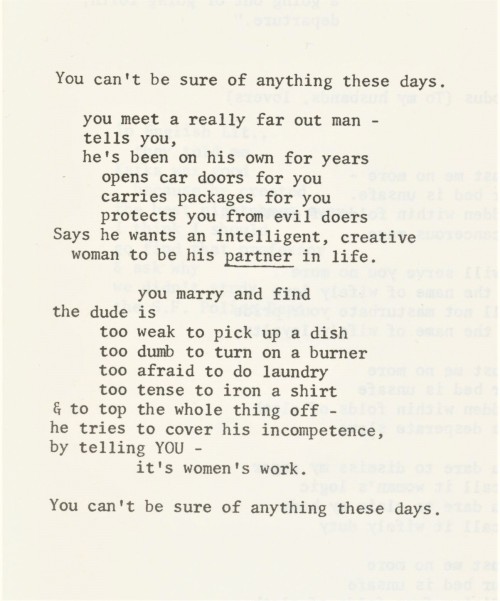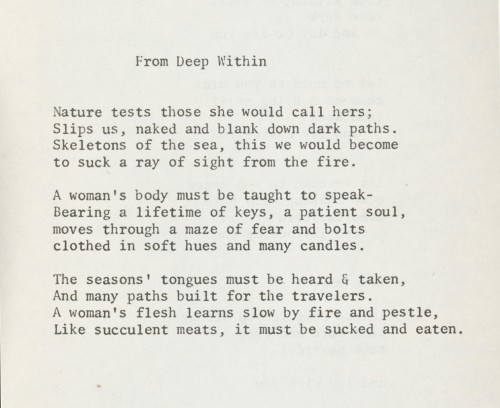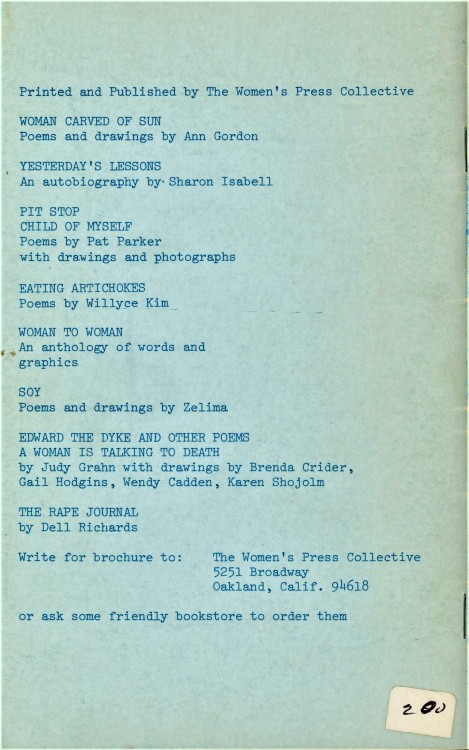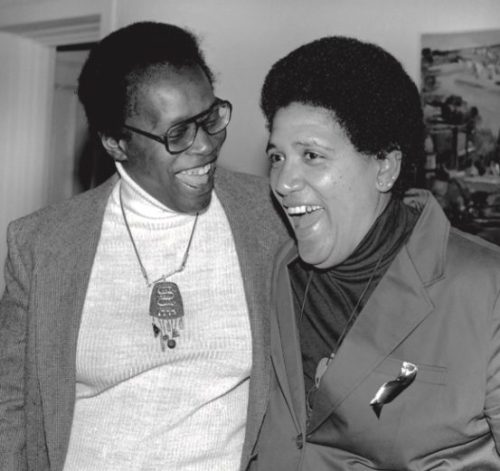#lgbt writers
Staff Pick of the Week
Child of Myself
Our collection preserves a second printing of American poet and activist Pat Parker’s first poetry book, Child of Myself, published in 1974 by the Women’s Press Collective.The illustrations for this printing were done by Brenda Crider, Wendy Cadden, Jerri Robertson, Karen Garrison, and “Helle.” Over the course of her life, Parker published five collections of poetry and was a champion in the fight for women’s and LGBT liberation.
Parker’s activism was extensive. Parker was the founder of the Black Women’s Revolutionary Council in 1980; an early supporter of groups like the Black Panther Party; and the executive director of the Oakland Feminist Women’s Health Center from 1978 to 1987—a revolutionary organization, offering abortion healthcare to women in California, which inspired the formation of the still active, Chico Feminist Women’s Health Center (CFWHC). She also aided in the formation of the Women’s Press Collective, the publisher of her first two poetry books. The Collective was established by photographer, printer, and publisher,Wendy Cadden, and her partner Judy Grahn, an Air Force officer turned poet and activist after being discharged for being openly gay. Producing books, poems, and graphics, the press strove to promote work by lesbians disenfranchised by race or class.
InChild of Myself, Parker challenges the socially accepted power dynamics of heterosexual relationships through critiques on women’s prescribed roles as housekeeper and caretaker. When reading Parker’s stream-of-consciousness poetics, we have to step back and appreciate the bravery of these Black, LGBT, women feminists, who endured in the face of multiple systems of oppression. Parker and friends’ fight for women’s liberation was even acknowledged by Black Panther Party Leader, Huey P. Newton, in a 1970 interview:
…we say that we recognize the women’s right to be free. We have not said much about the homosexual at all, but we must relate to the homosexual movement because it is a real thing. And I know through reading, and through my life experience and observations that homosexuals are not given freedom and liberty by anyone in the society. They might be the most oppressed people in the society.
Child of Myself was originally published in 1972 by Shameless Hussy Press, founded byAlta Gerrey in Oakland in 1969—the first feminist press in the United States! The release of this first poetry book was just the beginning of Parker’s incredible career as a champion for LGBT rights, coming out as lesbian after the release of her second collection, Pit Stop, published by Women’s Press Collective in 1973, and again in 1975. Parker’s third poetry book, Womanslaughter, published in 1978 by American feminist publishing house, the Diana Press, revolves around the issue of femicide and the trauma of domestic violence. Parker often spoke publicly about these issues, kicking off day three of the first National Conference of Third World Lesbians and Gays, on October 15th, 1979, in Washington, D.C., with a speech about her sister’s tragic death at the hands of her husband.
Due to the Diana Press’s closure in 1979, Parker’s fourth collection, Movement in Black, published by the press in 1978, went out of print until 1983, when the Crossing Press (now a part of Random House’sCrown Publishing Group) issued a facsimile edition of the collection. By 1987 the book was once again unavailable, until, shortly after Parker’s death in 1989, Firebrand Books published its first edition of the collection—this time, including a foreword by friend, poet, and fellow activist, Audre Lorde and an introduction by Judy Grahn. Ten years later, in 1999, Firebrand released An Expanded Edition of Movement In Black, which includes a new section of previously-unpublished work, an introduction by Cheryl Clarke, and “Celebrations, Remembrances, Tributes” by ten Black writers including Lorde,Angela Y. Davis,Pamela Sneed, and Barbara Smith (founder of Kitchen Table: Women of Color Press).
Parker’s fifth and final poetry collection, Jonestown & Other Madness, was originally published by Firebrand Books in 1985, then re-published in 1989, just before Parker’s death from breast cancer. If you click here, you can hear Parker read the title poem from the book. Parker’s legacy will not soon be forgotten. In June 2019, Parker was one of the inaugural fifty American “pioneers, trailblazers, and heroes” inducted on the National LGBTQ Wall of Honor at the Stonewall National Monument (SNM) in New York City’s Stonewall Inn. In 1991, thePat Parker/Vito Russo Center Library, was founded to encourage and facilitate the reading and research of LGBT literature.
Viewother Staff Picks here!
–Isabelle, Special Collections Undergraduate Writing Intern
Author Portrait from the National Black Justice Coalition
Picture of Parker and Audre Lorde courtesy of Susan Fleischmann, 1981, with permission of Public Books.
If you or someone you know is suffering from domestic violence and looking for help, don’t hesitate to reach out to the free, 24/7,hotline through text, chat, or call at 800-799-7233.
Post link
When I was little I was taught to not start multiple projects at once because I’d get confused or mess them up or end up half-assing them.
I was taught when I start doing something, to finish it and then start up with something new.
It took me years to realize that while this is a good way to do things, it doesn’t work with creativity. There are so many stories that I never even thought to write down because I was scared that if I wrote two things at once I wouldn’t do a good job. I was terrified of writing more thing than one, despite having the inspiration and want to do it.
At the start of this year, I decided to take a break. Having written two stories in the last I just needed a break. And then I got inspired. I wrote 60k words and then I got inspired again but for a different story. I was still scared, but I realized something… I didn’t want to lose either of these stories.
So now, I’ve written 80k words on the first one and 20k words on the other. And both of them are so fuckinggood.
“bodies squished together on hideous blue fabric seats
the sun plays hide and seek with the clouds in the distance
we travel away from the liminal space of mechanical carrying birds
the glow through the window gives a backlight to your face as you look at me
angel-like with the rush of French countrysides behind you.”
- holy moments // m.b.
“learning to grow like the moss that covers the forest floor. untamed. willing to grow amongst the grand trees and rare vegetation. to cover this earth in a soft envelope. i wish to live fiercely, but with a soft heart.”
- green // m.b.
✨FICTION COMPETITION✨
Respond to the photo with either a short story (no more than 3,000 words) or a poem (no more than 2 pages) for your chance to be published and win a copy of Blue Pencils Anthology!
Send your submission to [email protected] no later than midnight 21st June for your chance to win.
Post link
Tweet from Lambda Literary (@LambdaLiterary)
Lambda Literary (@LambdaLiterary) Tweeted:
We talked with three self-published queer authors—Blue Delliquanti, M. Haynes, and Fiona Zedde—about their self-pub journeys, the state of contemporary publishing, and their advice for new writers.
@bluedelliquanti @fionazedde @LooseAsADEUCE
https://t.co/1qfUr1E4JWhttps://twitter.com/LambdaLiterary/status/1435241527475851265?s=20





The Battle of Seattle - Issue #2 by me











